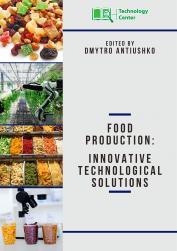Justification of the feasibility of using A2 milk in the production of some dairy products
Keywords:
products for enteral nutrition, herodietetic purpose, emergencies, elderly people, aging, metabolic activity, diabetes, raw components, approaches to classification, milk A2, hard cheeses, enriched milk A2, carrot powder, milk carotenoids, amino acids of milk, β-casein A2, biological value, cheese yield, milk proteins, functional products, multicomponent semi-finished products of a high degree of readiness, mechanism of competitiveness, concentration, drying, resource saving, film-like electronic heater of radiating type, structural and mechanical indicators, temperature field, cattle breeding, food safety, beef, quality of consumed proteinAbstract
The prospects of using A2 cow's milk in the production of dairy products were considered and analyzed. The object of research is the method of enriching A2 milk and the technology of hard cheeses made from raw milk from cows with different β-casein genotypes (A1A1, A1A2, A2A2). When digesting A2 milk, β-casomorphin-7 is not formed, which negatively affects the physiology of the gastrointestinal tract, cardiovascular, nervous and endocrine systems. It is recommended to use milk to which biologically active substances have been added, therefore the issue of its enrichment is relevant. In industrial conditions, artificial vitamin and mineral complexes are used to enrich milk. Taking into account that natural and synthetic substances act differently on the human body, it is proposed to use processed derivatives of carrots (Daucus carota) as a natural food additive. The use of carrot powders improves the amino acid spectrum of milk. The mass concentration of amino acids in A2 milk enriched with carrot peel powder was 4.87 g/100 g. The highest concentration, g/100g, of glutamic acid (0.84), proline (0.50), aspartic acid (0.42), leucine (0.41), valine (0.35) was found. It was established that the consumption of 200 g of such milk provides the daily needs of the body in essential amino acids: threonine, leucine and phenylalanine (by 16 %), methionine (by 4 %), isoleucine (by 14 %), lysine (by 18 %), valine (by 20 %). It was established that A2 milk, enriched with powder from whole carrot roots, has a higher content of carotenoids (0.1068 mg/100 ml), providing the body's need for them by 1.4 %. Such milk can be an additional source of vitamin A produced in the human body. It is recommended to use powder from whole carrot roots for the enrichment of A2 milk in industrial conditions. Physico-chemical indicators and cheeseability of milk of cows with different genotypes were studied. The content of fat, protein and solids in the milk of cows with the β-casein genotype A2A2 were slightly higher compared to A1A1 and A1A2. A comprehensive study of the quality indicators of hard cheese samples showed that the type of β-casein did not affect the sensory characteristics of the cheese. However, according to the content of the main chemical components, cheeses made from A1A2 milk had a higher content of dry matter and protein (on average, 61.6 % and 19.2 %, respectively) and a lower content of fat (37.2 %). The amino acid profile of cheese from the milk of cows with the β-casein A1A2 and A2A2 genotype showed a higher total content of amino acids – 14.89 mg/g and 13.84 mg/g, respectively. Calculations of cheese yield showed that cheese yield from milk of cows with β-casein genotype A1A2 was higher (mean value 13.1 %) than with A1A1 and A2A2. The obtained results are of practical importance, since it is possible to take into account how changes in the β-casein genotype in raw milk can affect the yield of cheese and, therefore, the profitability of production.

FOOD PRODUCTION: INNOVATIVE TECHNOLOGICAL SOLUTIONS
Downloads
Pages
Published
License

This work is licensed under a Creative Commons Attribution-NonCommercial-NoDerivatives 4.0 International License.

